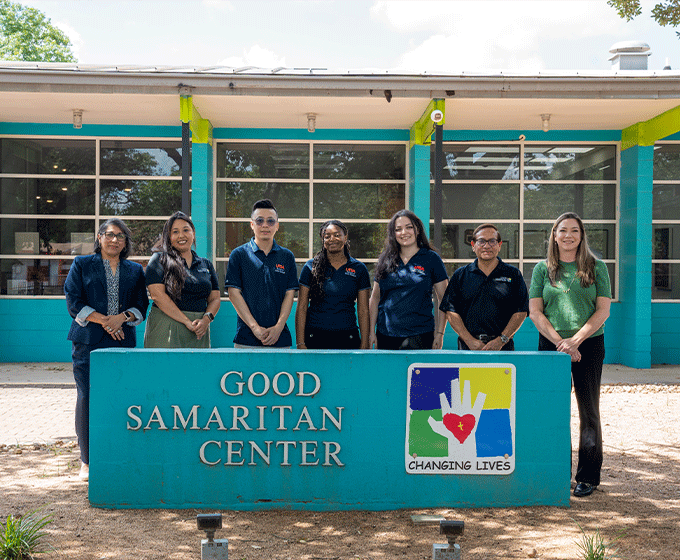
APRIL 30, 2025 — When the UTSA School of Data Science (SDS) partnered with H-E-B and United Way of San Antonio and Bexar County in 2024 to provide students with a paid, hands-on experience working with community non-profits, the program’s mission was always to advance students’ academic success and career readiness while making an impact in the San Antonio community. Now, as the Data Science & AI Community Innovation Scholars program (CIS) gears up for its second year, it promises to take these opportunities to the next level.
Jianwei Niu, interim executive director of the SDS and dean of University College, convened a cross-campus team of faculty members to develop a signature experience course designed to prepare students with focused training and hands-on practice for careers in artificial intelligence and related fields.
“A key motivation behind this experiential learning course is to provide students with practical, career-ready competencies through a combination of interdisciplinary training modules, skill-building seminars and project-based learning opportunities,” Niu said. “The course is structured around hands-on experiences and real-world applications, ensuring students are well-prepared for future careers in data science, artificial intelligence, and project management.”
Amanda Brown, associate director of strategic initiatives at the SDS, said this year’s cohort of CIS students will participate in a preliminary zero-credit-hour course designed to enhance their subject matter mastery and professional development.
“At the conclusion of last year’s CIS program, we realized that there was an opportunity to bolster the program by providing additional skills development to participating students, even extending beyond nonprofit projects alone,” she said.
Because the CIS program is open to students of all majors, Brown said one goal of the new course is to ensure that students of all backgrounds are equally prepared to tackle real-world data science problems.
“While there are some coursework prerequisites, the fact remains that students’ data science expertise varies depending on their majors,” she said. “All things being equal, an engineering student will likely have a stronger technical skillset than a student majoring in social sciences.”
The development of the new course has been overseen by SDS Faculty Affiliates Yufang Jin, a professor in the Department of Electrical and Computer Engineering, and Ian Thacker, an assistant professor in the Department of Educational Psychology, along with Isil Koyuncu, an SDS core faculty member and assistant professor in the Department of Management Science and Statistics.
Students participating in this signature experience course will complete eight individual modules before joining their nonprofit sites in the summer. The course also includes both pre- and post-tests, which Jin and her colleagues will use to help evaluate students’ preparedness and identify opportunities to improve the course and the CIS program.
Jin says the course is designed to prepare students for future careers in AI-related fields by building both hard skills, such as data-driven analysis and programming, and soft skills, such as professional communication, time management and leadership.
“The students will be trained from data collection and processing to results interpretation and dissemination, including statistical analysis using Excel, Structured Query Language (SQL), and other online tools for practicing artificial intelligence algorithms,” she explained. “Throughout the course, students develop both technical and professional competencies, enriching their experience and increasing their career readiness.”
In addition to technical training, the course also emphasizes soft skills that are essential for long-term success, said Lizet Casas, SDS senior program manager.
“By incorporating targeted instruction in soft skills like teamwork, communication and accountability, the course ensures students are not only technically prepared but also professionally ready,” she explained. “We are equipping students to navigate real-world challenges, collaborate with nonprofit partners and deliver impactful data-driven solutions — all while growing into well-rounded, career-ready professionals.”
Delivering data-driven solutions is at the heart of both the CIS program and its support for the signature experience course. In addition to fostering a community of talented professionals, Brown said the program positions students to make a positive impact while exposing them to novel data science applications.
“The nonprofit sector isn’t always top of mind for jobseekers, particularly in the field of data science where salaries can be highly competitive,” she said. “However, the fact remains that this is a sector where data science can be used for tremendous social good and to positively affect people’s daily lives. This program offers both talent and technology, which are in short supply for nonprofits.”
UTSA Today is produced by University Communications and Marketing, the official news source of The University of Texas at San Antonio. Send your feedback to news@utsa.edu. Keep up-to-date on UTSA news by visiting UTSA Today. Connect with UTSA online at Facebook, Twitter, Youtube and Instagram.
Move In To COLFA is strongly recommended for new students in COLFA. It gives you the chance to learn about the Student Success Center, campus resources and meet new friends!
Academic Classroom: Lecture Hall (MH 2.01.10,) McKinney Humanities BldgWe invite you to join us for Birds Up! Downtown, an exciting welcome back event designed to connect students with the different departments at the Downtown Campus. Students will have the opportunity to learn about some of the departments on campus, gain access to different resources, and collect some giveaways!
Bill Miller PlazaCome and celebrate this year's homecoming at the Downtown Campus with food, games, giveaways, music, and more. We look forward to seeing your Roadrunner Spirit!
Bill Miller PlazaThe University of Texas at San Antonio is dedicated to the advancement of knowledge through research and discovery, teaching and learning, community engagement and public service. As an institution of access and excellence, UTSA embraces multicultural traditions and serves as a center for intellectual and creative resources as well as a catalyst for socioeconomic development and the commercialization of intellectual property - for Texas, the nation and the world.
To be a premier public research university, providing access to educational excellence and preparing citizen leaders for the global environment.
We encourage an environment of dialogue and discovery, where integrity, excellence, respect, collaboration and innovation are fostered.